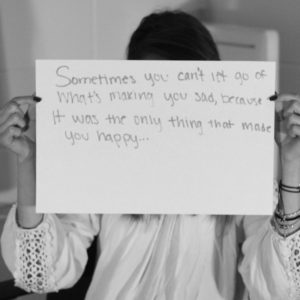
Anna Stegall, Liberal Arts major, bites her nails while under stress. Photo illustration by PJ Graham
The college atmosphere is like a pressure cooker that breaks down a student’s mind until it is pull-apart tender. With constant pressure from peers and the media, many students develop severe anxiety from the stress and many believe it is due to the environment.
“Everyone experiences some type of mental disorder, either it be stress or anxiety, depression and the list goes on,” Mary McClure, a DMACC councilor and psychology instructor said. “Actually, college students have a high percentage of mental health diagnosis, including depression, severe anxiety and sometimes, in worst cases, schizophrenia.”
Active minds is an organization on campus that allows those who battle with a mental illness to come and speak-out without feeling judged.
Ronn Newby, Active Minds adviser and psychology professor, organized the group because he felt the personal need to reach out to his students.
“My role as a teacher is to keep all of my students safe. And if I see a student in my class who looks like they’re struggling, I reach out to them and make sure he/she knows that there is help,” Newby said.
“There is more than just counseling. DMACC has licensed workers who have studied in specific mental illnesses, and these workers can provide help.”
Heather Vanderleest, liberal arts major who plans to transfer to University of Iowa for social work, is the secretary of Active Minds and is passionate about being involved.
“The goal for Active Minds is to reduce stigma by getting rid of the bad reputation of being mentally ill,” Vanderleest said.
 The services and programs, as Vanderleest mentioned, are small workshops that focus on a specific mental illnesses. For example, McClure’s lecture “Anxiety 101,” is a one- time class that discusses symptoms and how to cope with anxiety. This class is one of the services that the counseling provides in order to spread awareness.
The services and programs, as Vanderleest mentioned, are small workshops that focus on a specific mental illnesses. For example, McClure’s lecture “Anxiety 101,” is a one- time class that discusses symptoms and how to cope with anxiety. This class is one of the services that the counseling provides in order to spread awareness.
Hannah Martin, 19, liberal arts major with a focus in psychology, agrees that mental illness has a bad reputation. She also believes that having a mental disorder should not marginalize a person.
“When I think of a mental illness or disability, I believe that society portrays it as a bad thing – that those who are mentally ill need more assistance. And I think that they are embarrassed to be mentally ill because it makes them feel different,” Martin said. “And the truth is, they really aren’t.”
Martin has dealt with mental illness from her mother who has
severe depression, and soon led to substance abuse. She stated, “The programs and services that we [DMACC] have are very helpful for students. There are councilors, therapy sessions, and a lot more help.”
Although there are the many stigmas of mental illness, such as being considered weaker, or being different, some say that the college environment magnifies a mental disorder through the media and peer pressure by making the illness worse.
Anna Stegall, 19, liberal arts major who plans to join a program called BUNAC after DMACC. It is a service that helps kids around the globe.
Stegall mentioned that the stigma is highly influenced by social media accounts, this is where a group of people can discuss their opinion.
“Many mental health movements have been based off of Twitter, and I would also say that Twitter has been a cause of the bad reputation because of online bullying being a new frontier,” Stegall said.
Stegall is diagnosed with severe anxiety and she tries to find other ways to deal with her mental illness through herbal and aromatherapy. She also explained that the media and the college environment bring a heavy amount of pressure to students.
“I believe that doctors over-prescribe [medication] now, but only certain cases. And now, with social media being a huge role in our society, someone’s mental illness can be caused by the pressure of the mass media,” Stegall said.
Meanwhile, other students, including Ron Davis, 19, liberal arts major, have little-to-no experience with mental illnesses on campus, but noticed on social media how severe a mental health can be and how college students are affected.
“[Mental health] is a big deal, but I believe that social media over-hypes mental illness,” Davis said. “The social media aspect sometimes makes the situation worse than it already is by making the person feel unaccepted.”
Substance abuse on college campuses has become a central issue because many use drugs and alcohol as an outlet from the stress of school. However, the schoolwork is not the only factor, but from their peers and the media as well.
The issue of substance abuse is prevalent on all college campuses, and most believe that the administrators should take action. However, that is not exactly the situation because the administrators have their hands tied behind their backs.
“The apartments on campus is like having an apartment in downtown Des Moines – it’s a private housing contract and the manager only deals with the issue,” Laurie Wolf, Dean of Student Services said.
It’s up to the apartment management to monitor illegal substance use, not DMACC. However, to bring a solution to the issue of drug usage as a stress reliever for students, Wolf recommends that having school-owned housing would be beneficial.
“Mental health is a huge issue across the country. A lot of folks self-medicate when they come to college, and it is a very risky game to play,” Wolf said. “Recently at DMACC, we are starting a three-year grant that reaches out to our students. And we are limited to who will reach the message because many would say, ‘it doesn’t involve me.’ And, with this grant, it will allow students to be more aware.”
So, why does entering college and living in this type of environment increase the cases of mental illnesses?
“Suicide is the number two killer on college campuses,” Vanderleest said. “I believe that the transition from high school to college is a big step. You are thrown into an environment where you have many responsibilities and it is very stressful, so some will use drugs as an outlet. And now, it is socially acceptable for students to participate because all of their friends are doing it.”
Transitioning from high school to college is a big step, and Stegall, Davis and Martin all agree that starting at a four-year university brought a lot pressure to their lives.
“At Iowa State, where I transferred from, I dealt with a lot of stress and anxiety,” Stegall said.
“I did a lot of stupid stuff that was meaningless, and I felt that I wasn’t really pressured by my friends, but I felt like I was missing out.”
That issue is not the college in general, but the layers of pressure from friends. The media, and the constant exposure to stress are not being dealt with correctly, leaving most students to use drugs as an outlet.
The three-year grant, as Wolf mentioned, is a fund that gives colleges the opportunity to provide efficient services to the students with mental disabilities. One of the main programs that DMACC provides is a counseling service called “Live for Today.”
It is time to end to the ignorance of mental health and begin to take action in making campuses a safer place.
“It doesn’t matter who you are; it matters that you are being active and have a support system,” Newby said.
As the motto stated, “It’s okay to not be okay,” said Dave Romano, Active Minds Speaker.
SUICIDE PREVENTION LIFELINE: 1-800-273-TALK (8255). CRISIS TEXT LINE: Text START to 741741.





Comments